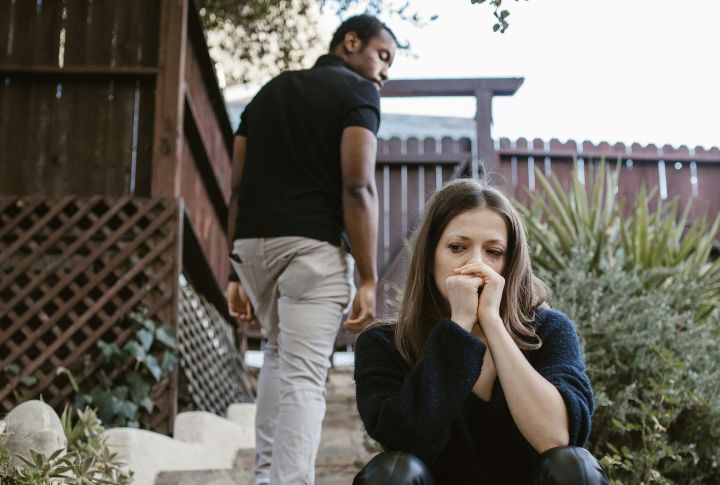
Not everyone learned that love means safety. For some, closeness still feels like walking on glass: Every emotion carefully managed, every silence a shield. These quiet defenses mostly trace back to childhood lessons about survival. So, how do those early coping styles echo through adult life? Let’s discover the patterns together.
Resorting To Silence During Conflict

Silence becomes a carefully learned way to minimize emotional storms. What starts as self-protection soon turns habitual. By the time they’re adults, that same instinct to stay quiet during conflict lingers. Even when hurt or misunderstood, they retreat inward, mistaking silence for safety.
Feeling Intense Discomfort When Asked To Name Their Emotions

After years of sidestepping emotional talks, their brain becomes a pro at emotional dodgeball. When feelings finally show up, the words just disappear. Muscles tighten, and suddenly they’re stuck in an emotional game of Twister. The easiest move? Retreat. Back to the safety of silence and away from anything too raw.
Withdrawing From Relationships When Tension Arises

When things start to get complicated, disappearing feels easier than explaining. It’s not malice—it’s muscle memory. Early lessons taught them that closeness often leads to pain, so distance becomes a kind of safety. Ghosting is self-preservation disguised as control over when and how to hurt.
Over-Relying On Solo Problem-Solving

They take pride in handling everything alone. But beneath that self-sufficiency lies a deep discomfort with dependence. If they let someone help, it feels too exposed. So, they turn independence into armor and wear competence like a shield that hides a quiet longing for connection and relief.
Not Initiating Difficult Conversations

Picture the young mind as a tiny escape artist that rehearses getaway plans from emotional storms before they hit. It starts as a child’s creative solution—mentally mapping exit routes from tricky talks—and gradually becomes their go-to move. Soon enough, difficult conversations feel as natural as ducking raindrops.
Downplaying Their Needs To Avoid Seeming Burdensome

Behind the shield of “I’m fine” lies a carefully crafted pattern of minimizing needs and avoiding burden. But this protective reflex often backfires. A childhood strategy to dodge distress or rejection gradually becomes a self-imposed barrier, which leaves genuine needs unvoiced and vital connections untapped.
Using Humor To Dodge Vulnerability

These people possess a seemingly odd trait. They’re often the life of the room: quick with a joke, sharp with timing. However, their humor is a camouflage. When things turn serious, they pivot to laughter to change the emotional weather in seconds. Beneath the punchlines lies fear, which stems from having learned early on that vulnerability invites hurt.
Feeling Guilty For Needing Comfort

They’re the first to show up for others but the last to ask for help. To them, wanting comfort feels wrong, almost indulgent. That guilt traces back to childhood lessons, where independence was praised and vulnerability met hesitation. Now, the moment they crave reassurance, they shrink instead.
Struggling To Identify What They Truly Want In Relationships

Years of emotional self-protection can dim the signal between heart and mind. The more they’ve learned to mute feelings, the fainter their own desires become. So, they drift toward comfort instead of connection—until even love starts to feel like something that happens to them, not for them.
Interpreting Emotional Intensity As Danger

For some people, strong emotion feels less like a connection and more like a threat. As children, they learned to equate intensity with chaos, so even healthy passion or confrontation can set off alarms. Their bodies become tense, and they react to an old lesson that said emotion equals danger.
Feeling Safer In Roles That Require Caretaking

Being the caretaker comes naturally; being cared for feels foreign. It’s protection at best. They learned early that control meant safety, and caretaking offered just enough closeness without the risk of dependence. The result is a tender irony: they comfort everyone but themselves.
Experiencing Physical Tension During Emotional Intimacy

Their body tells the story their words won’t. A fluttering stomach and a subtle retreat behind the eyes. These quiet rebellions against closeness are echoes of old fears, learned long ago. Even as love leans in, something deep within whispers: stay still, stay safe.
Choosing Emotionally Unavailable Partners To Maintain Distance

It looks like bad luck in love, but it’s actually familiarity disguised as fate. They’re drawn to people who can’t fully show up because it feels predictable. Emotional unavailability mirrors the guarded environments they once knew, which allows them to crave connection without ever having to risk true vulnerability.
Delaying Decision-Making To Avoid Potential Regret

They overthink every choice until the opportunity quietly slips away. The hesitation is self-protection. Regret and confrontation feel like emotional traps, so they trade action for safety. However, the longer they delay, the smaller their world becomes, because avoidance slowly masquerades as careful thought.
Feeling Exposed When Praised Or Spotlighted

To most people, praise feels validating. To them, it feels exposing. Being noticed stirs an old discomfort, the fear that attention might turn into expectation or judgment. That’s why they downplay their success, sidestepping compliments to regain control. It’s their quiet attempt to stay safe.
Chronic Over-Scheduling To Avoid Emotional Downtime

A full schedule can look like ambition, but sometimes, it’s protection in disguise. Staying busy keeps difficult emotions at bay. It begins as productivity, but soon turns into avoidance. The constant motion shields them from the discomfort of introspection and the vulnerability of emotional rest.
Interpreting Others’ Emotional Needs As Manipulative

They flinch when emotion reaches for them, as if the warmth might burn. What others intend as closeness, they feel as intrusion. Somewhere long ago, they learned that needing—or being needed—can turn heavy fast. So, they step back to keep their own balance intact.
Feeling Relieved When Relationships End

When relationships end, their first feeling is relief. The tension of closeness finally lifts, replaced by calm they mistake for peace. This reaction is their nervous system unwinding. Their childhood experiences taught them that distance feels safer than connection, even when that connection once felt deeply meaningful.
Feeling Anxious When Asked To Share Personal Stories

There’s a quiet panic that rises when someone says, “Tell me about you.” Memories they’d rather not touch begin to stir. At that time, they smile and deflect, which is a defense strategy. Past taught them that sharing too much can backfire, and that lesson still lives in their mind and body.
Mentally Rehearsing Exits In Emotionally Charged Situations

In tense moments, their mind quietly looks for the nearest exit: what to say and how to leave without making it worse. It’s instinctive and not dramatic. As children, planning escape meant safety to them. As adults, it’s still their way of staying in control when emotions start to feel too big.

